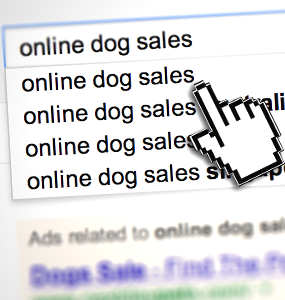
For more from Dr. Ernie Ward, find him on Facebook or at www.drernieward.com.
Online animal sales: it starts with a Google search and it ends with new enforcement from the USDA. And I think this is a step in the right direction.
The USDA (United States Department of Agriculture) recently revised its rule to help curtail sight-unseen sales of animals over the Internet. In doing so it is closing a loophole inadvertently created in 1966 when the Animal Welfare Act (AWA) was enacted. The AWA originally set minimal living standards for animals for retail sale. Pet retail stores were exempted from AWA because buyers were able to examine the animals prior to purchase, thereby ensuring proper living conditions. Previously, if you sold any animal without allowing the purchaser to see face-to-face the animals and conditions in which they were housed, the facility needed to be inspected and licensed by the USDA APHIS (Animal and Plant Health Inspection Service). This worked fine as long as most animals were sold in a traditional pet store setting. Well, maybe not fine, but at least in accordance with the AWA. As time marched onward, the way people purchasedpets began to change.
Fast-forward to 2013 and the USDA found that over 80% of dog breeders were not licensed under AWA because they claimed “retail pet store” exempt status. The problem was, these breeders were selling their animals over the Internet, sight-unseen, thereby violating the spirit of the AWA. In May 2012 the USDA’s APHIS declared it was time to change their definition of “retail pet store” to reflect current technology and trends. Eighteen months later, in November 2013, we may actually see these much needed changes take effect.
The rule change is far from perfect, but I applaud any attempt to curtail Internet sales of animals. It’s been too easy for too long for unscrupulous breeders to hide behind a pretty website. Breeders who’ve been doing the right thing all along should have nothing to fear. Those who wish to keep animals in less than ideal settings will not welcome an APHIS inspector knocking on their kennel door.
 Keep in mind the original purpose of the AWA was to make sure breeding animals had the most basic and humane living arrangements possible. Some claim its just another way for the government to take their money. I say it’s the price to ensure puppies and kittens have a decent place to live. I’ve seen too many Internet animals sick, frail, and frightened on delivery to block any regulations I think will help these poor defenseless creatures.
Keep in mind the original purpose of the AWA was to make sure breeding animals had the most basic and humane living arrangements possible. Some claim its just another way for the government to take their money. I say it’s the price to ensure puppies and kittens have a decent place to live. I’ve seen too many Internet animals sick, frail, and frightened on delivery to block any regulations I think will help these poor defenseless creatures.
APHIS is restoring the definition of “retail pet store” back to its original intent: “…the animals available for sale are physically present so that the buyer may personally observe the animal and help ensure its health prior to purchasing or taking custody of it.” Traditional pet stores will continue to be exempt from licensing and inspection under AWA. I’m not pleased with that but maybe we’ll get that changed next go-round.
Breeders can still maintain four breeding females and be exempt from the new rule. My fear is that breeders will use this clause cleverly to avoid governmental inspection and licensing. If we see a surge in the number of breeders claiming, “I only have four breeding dogs,” we’re in trouble. We’ll have to wait and see if this happens.
Other exemptions include: “Many animal rescue groups, pounds, shelters and humane societies will continue to be exempt from APHIS regulations. Also exempt are the following: people who breed and sell working dogs; people selling rabbits for food, fiber (including fur) or for the preservation of bloodlines; children who raise rabbits as part of a 4-H project; operations that raise, buy and sell farm animals for food or fiber (including fur); and businesses that deal only with fish, reptiles and other cold-blooded animals.”
Rarely does progress proceed in leaps; most improvements are made in steps. This is another step in the right direction when it comes to protecting our pet loved ones.
If you have any questions or concerns, you should always visit or call your veterinarian – they are your best resource to ensure the health and well-being of your pets.
